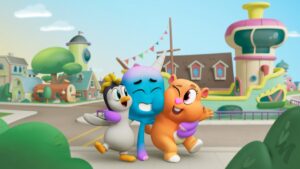Or: Heisenberg would have made a great Producer.
A great quote from Ed Catmull:
“On managers self-destructive tendencies for creative work:
The notion that you’re trying to control the process and prevent error screws things up. We all know the saying it’s better to ask for forgiveness than permission. And everyone knows that, but I Think there is a corollary: if everyone is trying to prevent error, it screws things up. It’s better to fix problems than to prevent them. And the natural tendency for managers is to try and prevent error and over plan things.”
Another great quote that I like is from General G.S. Patton:
“If everybody’s thinking alike, somebody isn’t thinking.”
A production of any significant size and complexity is one of inherent uncertainty and it becomes the responsibility of the Producer to manage this. Part of our reason for being in this position is to anticipate everything that can go wrong and take steps to avoid it. One can take this too literally and spend far too much time in trying to solve issues before they occur.
There will always be what can be considered are certain amount of waste that takes place. The mistake would be in thinking that this is always a bad thing. Obviously too much waste of resources will sink your project but trying to resolve all potential issues will surely sink your project faster. In a creative process there will always need to be a certain amount of experimentation that is required in order to solve problems associated with the desired outcome. Things like, “How do we animate hair like that?”, or, “How do we get the Bot AI to react the way we want?”.
Sometimes these issues get categorized as R&D costs and that is fine. Remember that there can be R&D costs associated with all sorts of things that you will not be able to anticipate until they happen. At that point they tend to be categorized as over budget line items which can then lead to all sorts of crying and wailing.
A good practice is to assume a certain amount of extra cost within a given creative process as well as extra time that may be required in order to deal with ambiguous requirements that may arise. This doesn’t mean you always add X amount of cash/time to every process but you need to make well-informed judgment calls for each creative process under your care. Budgets are too tight to assume extra cost for everything. You need to make judgment calls based on yours and your teams experience.
Expect mistakes to happen. If you encourage an environment of collaboration then when mistakes do take place it becomes more of a group initiative to fix them.
Create a more regimented environment then mistakes will still happen but no one will want to point them out and by the time you hear about them it will be too late to do anything about it.
There are all sorts of definitions that can be used for best practices and I have used a few in articles before. Bottom line for me is if you want to be a part of something that is successful, how ever you wish to define that, and then be part of it. Don’t try to over control it. Until someone invents a real Heisenberg Compensator, (Star Trek joke), then you need to accept the fact that no one can anticipate everything that can go wrong. Nor should you, as that is part of the creative process.
Expect the unexpected but don’t waste too much time in trying to avoid it. Deal with it as it comes!







Very interesting read!
Seems like a very specific way of saying, “Go with the flow”, whatever the circumstances may be.
“Just because something doesn’t do what you planned it to do doesn’t mean it’s useless.”
“If I find 10,000 ways something won’t work, I haven’t failed, I’ve just found 10,000 ways that won’t work. I am not discouraged, because every wrong attempt discarded is another step forward.”
Thomas Edison
Nice one!
While I am a fan of Zen thought, I would have to say that you don’t want to go too far with the flow. It is more about balance and making sure that the absolute most is gotten out of a creative process.
I have seen projects swing too far with the too relaxed approach and end up exploding.
It is better to be the water than the rock. Both in the ideals that you can bend with your surroundings and also not let obstacles stop you. ( must read in a Maco style of voice)
Wax on…. 🙂
I mixed my movie references…
These are really valuable thoughts. I think anyone involved in anything creative has to establish this same kind of balance, at one point or another. But…
This may be a bit of a radical leap for this particular subject, but I think what we really need to do is get past this whole working for money thing. It’s kind of the elephant in the room in a lot of these posts, where it’s always the artists that suffer because someone up the ladder is “crying and wailing.” We can sit around talking about management styles or just recognize that the problem is the people doing the crying and wailing.
On one hand, you can argue that all art has an obligation to find its audience, so it’s fair to expect it to function as a commodity. On the other hand, you can just as easily say that it’s not up to the artist to sell his/her own work, so he/she shouldn’t have to deal with the nagging and pushing and shoving that leads managers to be too pushy, etc.
What really bothers me about the animation industry in particular is that the commodity aspect is so huge, that animation as an art form is (in my very humble opinion) always at the cutting edge forefront of selling out our hopes and dreams to make a quick buck. Then, later, you turn around and see remarks like these, which may seem perfectly innocent, but in another light, they can also be seen as reflections on how to squeeze more of the life out of your creative people, for profit.
I’m all for going with the flow. As long as the flow is going in the right direction.
What does everyone else think?
Hi Yan
I think you have raised some interesting stuff here. I think there are many forms of art and many forms of art within the animation medium. Everything from Franklin the Turtle to any thing by Norman McLaren. The difference between the two styles I mention is the first was made as a product to appeal to a specific age group and to be broadcast to said age group in the hopes that more and more would watch it. In so doing more advertising revenue would be generated and the show would be made for seasons perpetual.
Norman McLaren was paid by the NFB ( and all Canadians since the NFB is a Crown Corporation ) to make films he wanted or, could be argued, needed to make. There aren’t many artists that get to be able to do that at the NFB. It is an extremely talented well deserved group but very small.
I don’t know about you but when I work of a Franklin the Turtle type of show I like to get paid and I hope to get paid well for the work I do on it. I don’t think that means I am a sell out. I think it means I am a professional in the entertainment industry.
On the other hand I work on all sorts of things that I don’t get money for. These are either my own projects are ones that friends are doing that I really believe in and think need to be made. Does that mean I am a sell out?
I think that animation in the mainstream medium at least is not just an artform in itself. It, like all film making is a craft. It is a skilled profession.
Art for art sake means you do what you need to do when you can to tell the stories that you need to tell.
Working in animation isn’t necessarily the same thing but you can still be proud of what you can accomplish while being paid to do so.
Something that lets me sleep at night; remember that you are helping to create entertainment. Broadcasters want to air this entertainment because A, they are legally required to do so (Canadian Contant Regulations) and B, they are not allowed to air commercials 24 hours a day (where they make the actual money that allows them to buy your show) C, the shows are entertaining and people will watch them. If A or B ever see radical change then C won’t really matter. We will all be working on shows that are 30 seconds long. Animation IS an industry after all.
industry |ˈindəstrē|
noun ( pl. -tries)
1 economic activity concerned with the processing of raw materials and manufacture of goods in factories : the competitiveness of American industry.
• [with adj. ] a particular form or branch of economic or commercial activity : the car industry | the tourist industry.
• [with adj. ] informal an activity or domain in which a great deal of time or effort is expended : the Shakespeare industry.
2 hard work : the kitchen became a hive of industry.
A few other things occurred to me after writing my reply to you Yan.
I need to be more careful when spelling!
I didn’t even talk about doing indy animation and how one might make a living doing that.
Maybe you would also like to see some articles that are more focused on art than on the business side of things?
All good points that you made by the way!
🙂
Hi Rob,
Thanks for your reply.
I hope it didn’t sound like I was accusing people of selling out, just that the animation industry as a whole tends to be a little suspect sometimes. For example, I could make a case that some recent Pixar films are actually terribly, horribly self-contradicting, and that while they appear to have good, heart-warming messages, they are in fact somewhat depraved and soulless. (Take it with a grain of salt. No film is all good or all bad. I’m just saying there are two sides to it!)
On a similar note… I’ve always resented Disney films for how they’ve distorted the stories they tell, going right back to The Little Mermaid. Don’t get me started on that!
When I read your post, I thought yeah, it all makes sense. But in the end, it just comes down to the nature of collaboration. There seems to be a certain added pressure coming in from the economic side of things, though, forcing you to justify the costs associated with the little detours and mistakes that occur along the way. And that’s what I was referring to as the elephant in the room. You shouldn’t need to justify anything. Any team, in any business, would incur similar kinds of costs.
I understand, though, that I’m making light of a difficult situation. It is an industry, and the job needs to get done. If so, though, we can’t disguise it as art any more. Or, at least, we should be a lot clearer about the boundaries… what part of it is art and what part of it is just a product to be sold.
I just watched A Chairy Tale by Norman McLaren, on the NFB site… and that’s definitely art. 🙂
A company like Pixar, though, in my humble opinion, is just making a product. It’s a damn good product, but it’s still just a product.
There’s a real danger here of people getting confused, and also of them selling themselves short. It’s as though people feel so lucky to be doing something creative, they turn it into something more than it should be, and then out of guilt over their pride, they let themselves be treated like crap.
There’s nothing wrong with doing a job. But if it’s just a job, then there should be clear boundaries about what the duties are and what can be expected of those involved… in which case, there should be very few hang-ups associated with the collaborative process.
If it’s more than a job… then the economic factors need to be separated from the creative ones. No human being can be expected to pour their heart and soul into something and appeal to a particular market at the same time. We’re seeing that now, and in my opinion, it leads to work with very mixed messages… *cough*Pixar*cough*.
Yan, I think what you are saying is very true in many respects.
Yes it sucks that money has to get in the way. Not sure how we can avoid it though. Especially on a large film or TV show. Any business that manufactures a product, be it a film, shoe, house or what ever needs to be able to justify the costs of everything involved. Sadly that is the world we live in. The more money it costs to make something the more eyes will be watching that bottom line. That doesn’t mean the creative forces need to suffer though. Just be aware of what the limitations may be and work within them.
There are guys like Bill Plimpton making his own films with a very small team and he is pretty successful at it. Nick Cross has been making his own films for a while now and he uses the money he makes from the product(TV shows) he works on to tell his own stories.
It’s odd but I have noticed a growing trend on boards over the past week discussing art vs product and what is the difference or even why there has to be one.
A lot of comments suggest to me that many people think that if you make money creating art then you aren’t an artist. I’m not suggesting that is what you are saying but there is a subtle inference to this thread leaning that way? It really is a very old battle and goes into every form of art in existence.
I really don’t think I’m criticizing people for making money. But I probably am criticizing them if they take money for producing animation and then call it art, when it’s really been influenced more by commercial factors than by anything else. Either way, though, it’s good that there are still people doing creative work!
The reason I commented in the first place was just to de-emphasize the need to frame everything in terms of business. The dollars and cents simply shouldn’t matter, or at least not to the people doing the creative work. I may sound idealistic by saying that, but I stand by it.
Hey, no worries!
I love what I do and love to have dialogue with others about this industry, in all its forms!
I think I understand what you are saying as far as commercialism vs art. I think it comes down to how you want to define art and that can sometimes be personal.
I am glad you stand by your convictions. It is a good thing to do so!
🙂